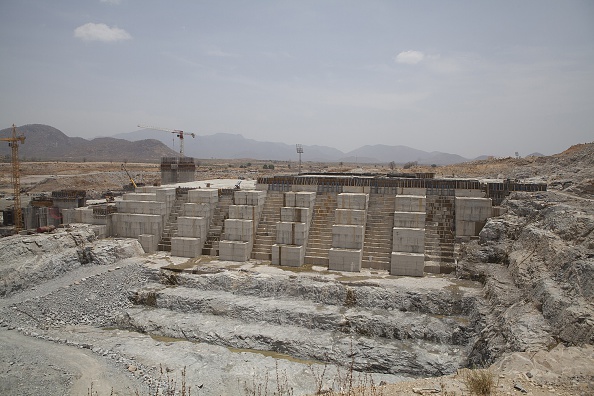Dr. Aref Ghareeb, a member of the Egyptian delegation to the Renaissance Dam negotiations, denied what was stated by Samuel Tafra, a member of the Ethiopian delegation, that the process of filling and operating the dam was previously agreed upon in the Declaration of Principles Agreement signed by Egyptian President Abdel Fattah El-Sisi and Sudanese President Omar al-Bashir, in 2015.
Gharib made it clear during his interview with (Mubasher with) on Al Jazeera Mubasher that the Declaration of Principles Agreement did not stipulate the rules for filling and operating the dam.
He added, "Ethiopia did not participate in Egypt and Sudan studies of the dam, and the three countries stopped negotiations after Ethiopia insisted not to complete the research committee."
Gharib stressed that there are no schedules for filling the dam, denying in his intervention that there are any that have been agreed upon until they are implemented on the ground.
He added, "The stages of filling the dam have requirements, and Addis Ababa has not adhered to any of them."
Gharib talked about several technical aspects, and said that the Ethiopian side did not adhere to what was agreed upon with Sudan and Egypt, and the second filling of the Renaissance Dam had conditions that were not met, and that Ethiopia did not adhere to what was agreed upon in the construction situation of the dam.
What are the reasons for #Egypt's agreement that the storage of the #Nahda_dam should be 74 billion cubic meters?
# Evening # Ethiopia # Sudan pic.twitter.com/INKEQOgE42
- Al Jazeera Mubasher (@ajmubasher) July 7, 2021
Gharib stressed that Ethiopia does not want to adhere to the special criteria for filling the Renaissance Dam, which is to take into account the years of drought.
He explained that Cairo suggested to Addis Ababa the presence of its representatives in the process of filling and operating the dam so that coordination could be possible, but the latter refused to do so.
The latest pictures of the Renaissance Dam - captured by satellite - in Egypt, which were sent by a member of the Egyptian negotiating delegation to Al Jazeera Mubasher, reveal that the Ethiopian side was unable to complete the second filling due to its inability to complete the rest of the construction.
He continued, "Ethiopia does not need to store all this water, and its goal in announcing the start of the second phase of filling is due to the internal policy reasons of Ethiopian Prime Minister Abi Ahmed," stressing that the dam's turbines have not been completed and Addis Ababa does not need to store this water and exacerbate the current situation.
Gharib added, "Ethiopia's start of the second filling of the Renaissance Dam is a unilateral step, and the notification of Egypt and Sudan of the second filling came with the aim of arranging their conditions."
Exclusive to Al Jazeera Mubasher.. Recent satellite images reveal the scenes of filling the # Renaissance Dam # Evening # Ethiopia # Sudan # Egypt pic.twitter.com/zcbV9tYH9p
- Al Jazeera Mubasher (@ajmubasher) July 7, 2021
Egypt, Sudan and Ethiopia are awaiting the Security Council session scheduled for today, Thursday, to discuss the Renaissance Dam crisis.
The foreign ministers of Egypt and Sudan held extensive meetings in New York on the eve of the Security Council session to explain the vision of the two downstream countries on the necessity of reaching a binding agreement on the management and operation of the dam.
Tunisia, the representative of the Arab Group in the Council, circulated a draft resolution calling on the three countries to stop any unilateral action, and demanding the resumption of negotiations at the invitation of the African Union and the United Nations in order to reach an agreement within 6 months.
Ethiopia called on the Nile Basin countries to form a front against what it described as the "colonial approach" of Egypt and Sudan.
Ethiopian Deputy Prime Minister and Foreign Minister Demke Moknin Hassan said that the Renaissance Dam represents the common aspirations of all riparian countries to benefit fairly and reasonably from water resources without harming downstream countries.
He added, in a meeting with ambassadors and diplomats from the Nile Basin countries in Addis Ababa, today, Wednesday, that the recent attempts by Sudan and Egypt to raise the issue of the Renaissance Dam to the Security Council through mobilizing the Arab League, would internationalize the issue and unnecessarily add security to it.
He pointed out that this leaves a dangerous precedent and takes the negotiation process away from the position of the African Union, stressing that Ethiopia believes that the Renaissance Dam is a development project that does not fall under the mandate of the Security Council, calling on the Council to respect the negotiations and the ongoing tripartite process led by the African Union.
The Ethiopian Foreign Minister also called on the countries of the Upper Nile Basin to form a front to oppose the approach followed by the downstream countries, which undermines the role of the African Union and confirms the colonial and monopolistic claims of the two countries, as he described it.

